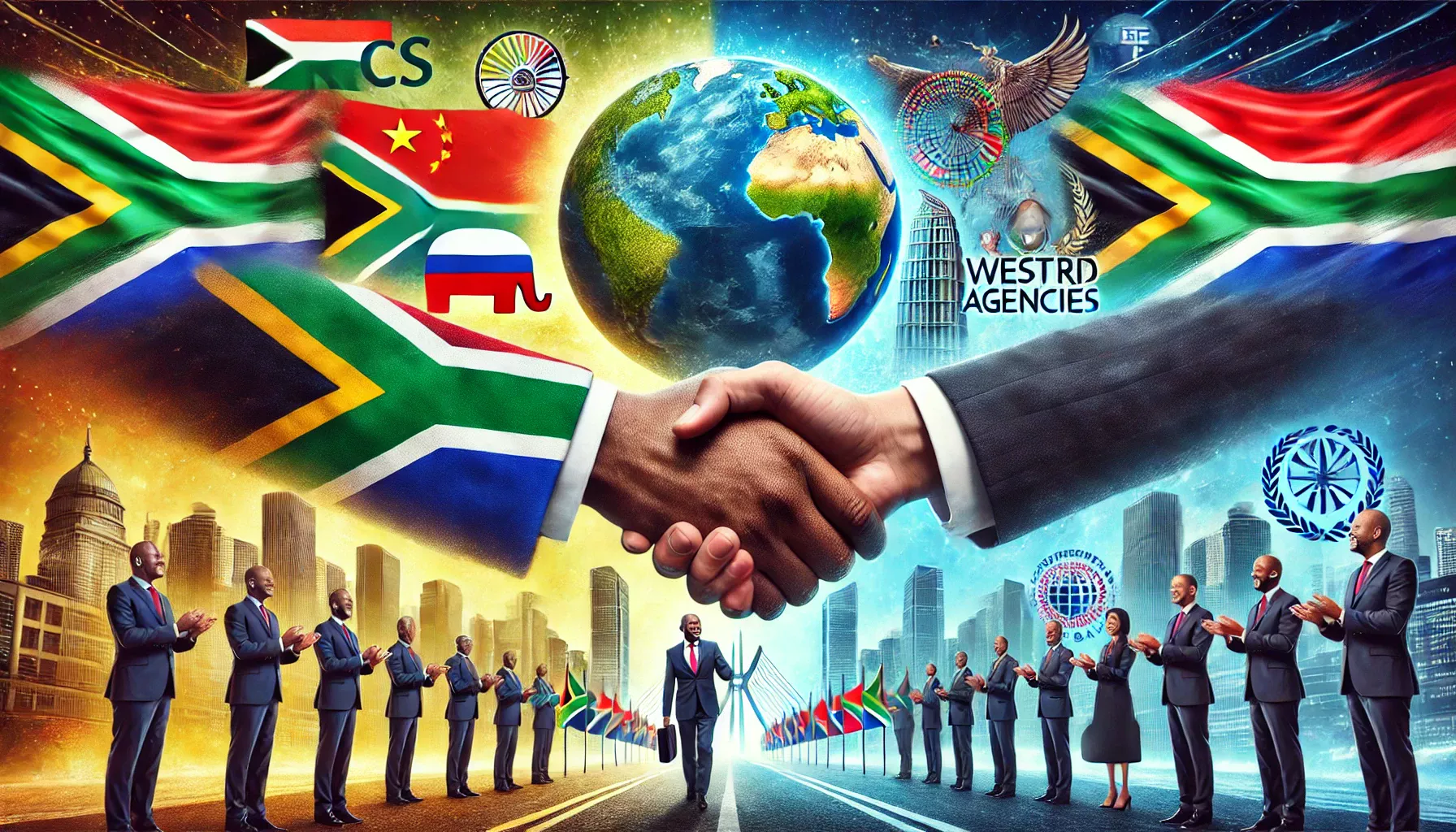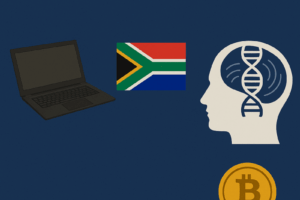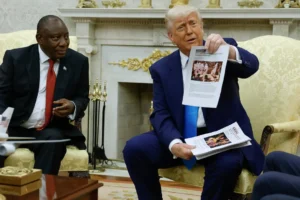
The Democratic Alliance and African National Congress National Government of Unity in South Africa: Shifts in International Alliances
Introduction
South Africa’s political landscape has been predominantly shaped by the African National Congress (ANC) since the end of apartheid. However, recent political dynamics have seen the Democratic Alliance (DA) emerge as a significant player. The concept of a National Government of Unity (NGU) between the ANC and DA presents a unique opportunity to explore potential shifts in South Africa’s international alliances. Specifically, this article examines how the DA’s foreign policy preferences might influence South Africa’s position within the BRICS coalition and its potential realignment towards Western agencies such as the World Economic Forum (WEF) and the World Bank.
Historical Context of the ANC and DA
The ANC, founded in 1912, has been the ruling party in South Africa since the country’s first democratic elections in 1994 (Southall, 2014). The party’s policies have been largely influenced by its historical roots in the anti-apartheid struggle and its commitment to social justice and economic redress (Butler, 2017). On the other hand, the DA, formed in 2000 through the merger of several opposition parties, positions itself as a liberal party advocating for a market-oriented economy, transparent governance, and the rule of law (Johnson, 2015).
The Concept of a National Government of Unity
The notion of a National Government of Unity in South Africa is not entirely new. Following the end of apartheid, the Government of National Unity (GNU) was formed, including the ANC, National Party (NP), and Inkatha Freedom Party (IFP). This coalition aimed to stabilize the country during its transition to democracy (Sisk, 1995). Today, a potential ANC-DA coalition would be driven by the need to address pressing economic challenges and political instability.
BRICS and South Africa’s Role
Since joining the BRICS coalition in 2010, South Africa has aligned itself with Brazil, Russia, India, and China in pursuing economic cooperation and development (Qobo & Soko, 2015). The BRICS nations aim to challenge Western dominance in global economic governance and provide alternative development models (Abdenur, 2014). South Africa’s participation in BRICS has been instrumental in diversifying its trade and investment partners, particularly with China (Alden & Wu, 2014).
The DA’s Foreign Policy Preferences
The DA’s foreign policy preferences contrast significantly with those of the ANC. The DA has consistently advocated for stronger ties with Western countries and institutions, emphasizing the need for South Africa to align with global standards of governance and economic management (Graham, 2020). The party’s stance reflects a broader liberal internationalist perspective, prioritizing free markets, democratic governance, and human rights (Johnson, 2015).
Potential Shifts in International Alliances
Moving Away from BRICS
An ANC-DA coalition might lead to a reassessment of South Africa’s role within BRICS. The DA’s preference for Western alignment could result in a gradual distancing from BRICS initiatives, particularly those led by China and Russia. The party’s concerns over China’s growing influence and its implications for South Africa’s sovereignty and economic independence have been well-documented (Graham, 2020). Additionally, the DA’s emphasis on human rights and democratic governance could create friction with BRICS members, particularly Russia and China, whose political systems diverge significantly from these principles (Qobo & Soko, 2015).
Alignment with Western Agencies
The DA’s foreign policy would likely push South Africa towards closer cooperation with Western agencies such as the WEF and the World Bank. The WEF, known for its annual meetings in Davos, Switzerland, brings together political, business, and civil society leaders to discuss global economic issues. The DA views participation in the WEF as an opportunity to attract foreign investment and integrate South Africa into the global economy (Graham, 2020).
Similarly, the DA’s policies align with the World Bank’s focus on poverty reduction, economic development, and good governance. The party’s commitment to market-oriented reforms and transparent governance would resonate with the World Bank’s principles, potentially facilitating increased financial and technical support for South Africa’s development projects (Johnson, 2015).
Implications for South Africa
A shift in South Africa’s international alliances from BRICS to Western agencies would have significant implications for the country. Economically, closer ties with Western institutions could attract increased foreign investment and aid, fostering economic growth and development. However, this shift could also lead to tensions with BRICS members, particularly China, which has become a major trade partner and investor in South Africa (Alden & Wu, 2014).
Politically, aligning with Western agencies could enhance South Africa’s global standing and influence, positioning it as a key player in promoting democratic governance and human rights. However, this realignment might also expose South Africa to greater scrutiny and pressure to conform to Western standards, potentially limiting its policy autonomy (Graham, 2020).
Conclusion
The prospect of an ANC-DA National Government of Unity in South Africa presents a unique opportunity to reevaluate the country’s international alliances. The DA’s foreign policy preferences suggest a potential shift away from the BRICS coalition towards closer alignment with Western agencies such as the WEF and the World Bank. While this realignment could bring economic and political benefits, it also poses challenges and risks that South Africa would need to navigate carefully.
References
Abdenur, A. E. (2014). “Rising Powers and the Security-Development Nexus: Brazil, the BRICS, and the Inter-American Development Bank.” Third World Quarterly, 35(10), 1749-1766.
Alden, C., & Wu, Y. S. (2014). “South Africa and China: The Making of a Partnership.” South African Journal of International Affairs, 21(1), 111-128.
Butler, A. (2017). Contemporary South Africa. Macmillan International Higher Education.
Graham, V. (2020). “South Africa’s Foreign Policy under the Democratic Alliance: A Shift Towards the West?” South African Journal of International Affairs, 27(3), 391-409.
Johnson, R. W. (2015). How Long Will South Africa Survive? The Looming Crisis. Hurst & Company.
Qobo, M., & Soko, M. (2015). “The Rise of Emerging Powers in the Global Development Finance Architecture: The Case of the BRICS and the New Development Bank.” South African Journal of International Affairs, 22(3), 277-288.
Sisk, T. D. (1995). Democratization in South Africa: The Elusive Social Contract. Princeton University Press.
Southall, R. (2014). “The African National Congress and the Regeneration of Political Power.” Journal of Modern African Studies, 52(2), 347-374.
Leave A Reply
You must be logged in to post a comment.




1 Comment
The analysis provides a balanced view of how an ANC-DA coalition could reshape South Africa’s foreign policy, potentially moving from BRICS towards Western institutions, offering economic opportunities but also geopolitical and sovereignty challenges.